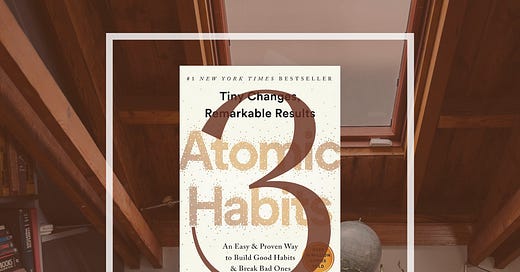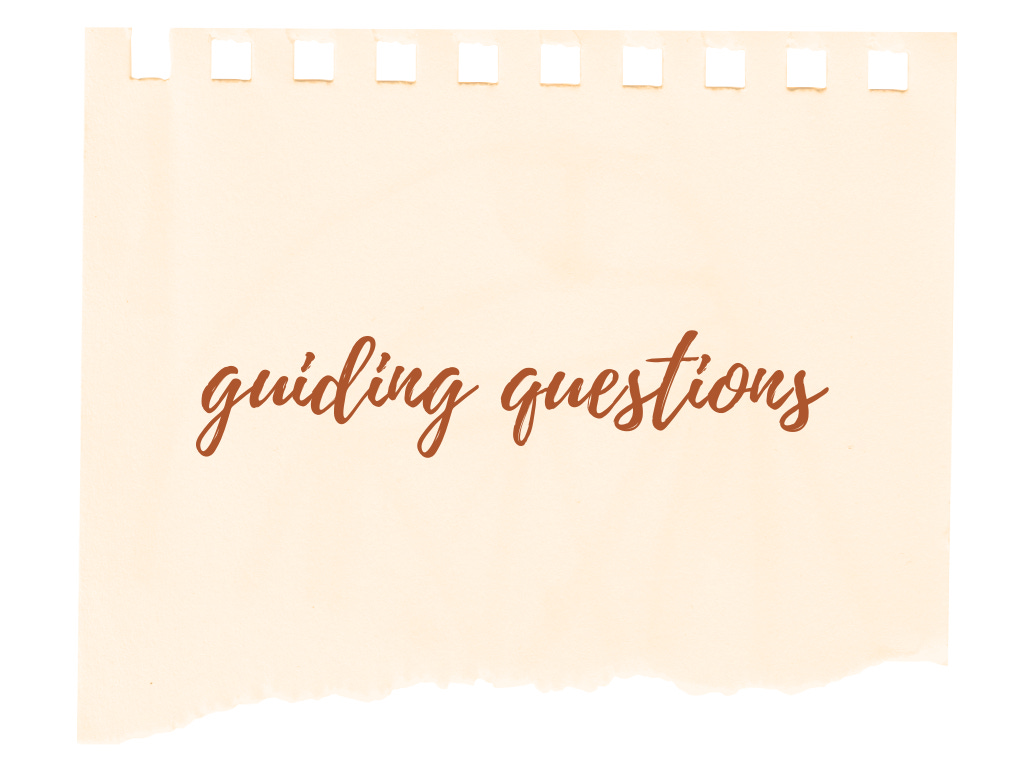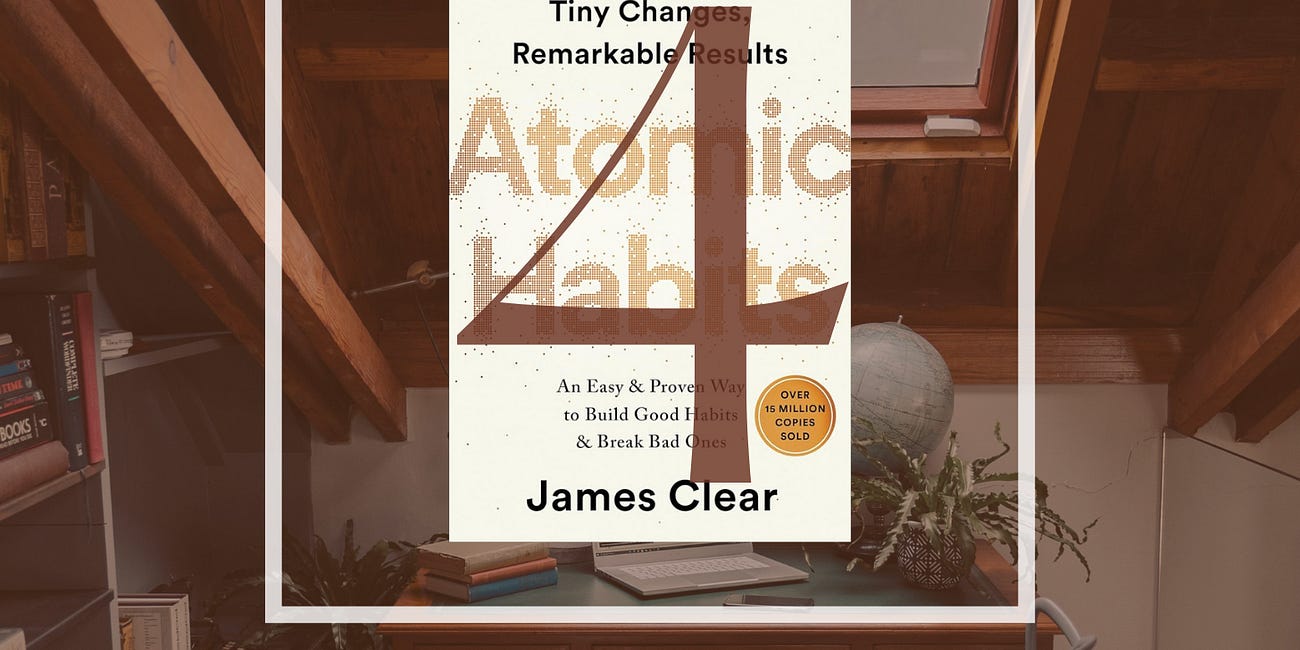The best thing about writing this newsletter series is that it has required me to experiment with new practices. I’ve been surprised and fascinated by the outcomes of those experiments, and I’m honestly having a great time. I don’t usually share much about my own writing practices or personal life online, but I’m finding it worthwhile to explore thoughts on this book aloud—and I hope you’re benefitting from seeing the ideas of Atomic Habits put into action.
Welcome to the third week of our Writers’ Book Club. Chapters 8-10 of Atomic Habits is all about using enjoyable habits to motivate you to perform more difficult habits. Today I’m sharing with you the results of my experiments with James Clear’s second law: make it attractive.
In Chapter 8 of Atomic Habits, James Clear presents the idea of temptation bundling, in which a person places a tempting activity just after the performance of new habit. Clear provides a template that I’ve slightly modified for clarity: “After (habit I need) I will (habit I find tempting).” After I write five hundred words, I will go for a walk in my favorite park. After I learn a new grammar rule for the day, I will listen to the podcast I like.
What temptations do you find are strong enough to make you want to perform a new, less tempting habit? I asked myself this question and then started an experiment that yielded very interesting results:
Temptation #1: Social Media. I started my experiment by telling myself I wouldn’t check social media until I was finished writing for the day. I figured this limitation would make me more eager to start writing each day and more likely to work diligently on the chapter at hand. But it accomplished neither. Because I quickly realized something surprising: I don’t actually care about social media. I care about checking social media, but I’m not sure what I’m checking for. Finding a “like” or a message there is moderately nice, but not terribly pressing. As it turns out, I don’t mind waiting longer to check social media!
This lines up with what James Clear illustrates in Chapter 8. The first time we try an activity that gives us a reward (“My post got ten likes already!”), our brain releases that delicious dopamine we love so much, as a way of training us to repeat the activity in the future. But after that, it’s the anticipation of reward, rather than the reward itself, that gives us a dopamine hit. Anticipating notifications on social media lights up my brain; receiving those notifications doesn’t (at least, not anymore). Which means social media, for me, isn’t tempting enough to propel me into my writing work…
Temptation #2: Screens. Next, I told myself that I wouldn’t do anything at all on a screen, except use text messages, until after I’d written for the day. In order to accomplish this, I turned off all of my email notifications, as I mentioned in my previous post. (All other notifications, except for phone, text, and calendar, are already disabled on my phone.) Since I write in the morning before I go to my other job, ignoring my email for a while is feasible for me. But this new rule made me miserable. On the day I started this rule, I kept feeling that terrible itch of knowing there were messages waiting for me that I hadn’t read.
In a desperate attempt to farm more dopamine (or whatever my brain was floundering for), I texted four different people. Sometimes I get into very long text message conversations, but on this particular day, these conversations didn’t last long and then, with nothing else to do… I just got to work. And once I started writing, there wasn’t anything else to do but write, so I got quite a bit of writing done.
Temptation #3: Video Games and Books. Although delaying email until after writing worked well, I also experimented with placing other temptations after my writing time: playing a level of a video game (something I usually do only in the late evenings or on weekends), and reading a chapter of a book (which doubles as ingraining another habit I want to increase). I wondered if I would write more and faster if I had a temptation pulling me onward.
The promise of playing a video game did indeed make me more productive, but this practice isn’t sustainable for me because I don’t play enough video games to make it a daily habit. And reading doesn’t seem to be a tempting enough reward; I love reading, but it isn’t as compulsive and addictive as other habits.
Temptation Bundling Results: Despite the failure of two out of three phases of my experiment with temptation bundling, the overall results were far greater than I had predicted. Simply limiting screens meant I got to spend more time writing, one of my favorite things to do, before decamping to my other job. I spent less time on activities that I crave but that aren’t actually enjoyable (checking email, checking social media). And I realized that I’m overall happier when I don’t get on the internet before noon.
But I don’t think it was temptation bundling at work. I think I just eliminated distractions from my work day, which was difficult to do, but which I was able to achieve mostly because I knew I’d be writing about it in this newsletter. Essentially, it was accountability that helped me start these better habits, which is a strategy we’ll talk about next week. Did you find any success with temptation bundling?
Competitiveness poisons me (or, as the proverb says, “envy rots the bones”). That’s why I don’t hang out with competitive writers. As independently-minded as I am, I know that if I hang out with such writers, I’ll adopt their habit of competitiveness. And I realized years ago that when I rise to the bait of comparison, I stop thinking about writing stories that match my own tastes and start thinking about how to write stories that will gain the same type of outcome another writer is enjoying.
Chapter 9 of Atomic Habits includes statistics that prove our peers shape us. James Clear claims that we imitate the close, the many, and the powerful. Any writer who uses social media knows it’s difficult not to imitate the many. If all of those writers are running giveaways, shouldn’t I, even if I’ve never known them to be effective? If everyone is writing in that genre, shouldn’t I, even if it’s not my natural instinct?
We can combat this by taking advantage of the fact that we’re also influenced by those writers we spend the most time interacting with (“the close”). Here are some ways I’ve noticed my close writer friends shaping my habits:
When my writer friends mention that they have been writing, I want to write.
When they tell me about a new plot structure they’re trying, I want to investigate new plot structures.
When they share their research for their latest manuscript, I want to research interesting background for my own manuscript.
When they list the novels they’ve recently loved, I want to find more novels I can get excited to share.
Honestly, my writer friends are good influences on me! And like I said, when I realize a writer cares less about inspiring other writers and more about eclipsing them, I say goodbye. Otherwise, their bad habits will start to change my identity as a writer.
I need more social time in my life. That’s the conclusion I’ve come to after reading Chapter 10 of Atomic Habits and trying to understand the causes of my bad habits. I think the reason I reach for my phone so often isn’t just that my brain enjoys the stimulation; it’s also that I miss connecting with people. I recently spent time with my college roommate and thought fondly of the community that college provided us. We could walk next door and say hi to our friends or head to a campus cafe to see who was around. But now, it takes weeks or months of advance planning to see my friends. And my non-writing job takes up so much of my time that I skip socializing so that I can use more time write. But after a busy and somewhat lonely fall, I’ve concluded that overworking isn’t sustainable.
Understanding the root of our bad habits can help us realize which new habits we need, and which current habits we need to re-frame. Socializing isn’t a luxury, and it doesn’t rob me of writing time (rather, my other job does that). I think if I spent more time socializing, I’d spend less time on social media, which usually makes me feel more, not less, anxious. I would also feel happier, which tends to lead to more creativity. What benefits do you see in avoiding your bad habits and adopting good ones?
Based Chapters 8-10 of Atomic Habits, here are some questions I’ve been asking myself, which you can also ask yourself:
Which of my current habits is tempting enough to delay until after I’ve carried out a new habit I want to start?
On what day and at what time will I try temptation bundling?
Which friends have habits I want to emulate? How can I spend more time with them?
What do my bad habits show me about my needs and desires? What benefits will good habits provide me with?
Week 4 of Writers' Book Club: Atomic Habits
Real writers write 1,000 words a day. That sums up the messaging I hear, anyway. But for several years, I found it impossible to write 1,000 words a day, and that daunting number made me anxious to sit down and start writing on any given day. No matter how much time I devoted to a writing session, I just couldn’t hit 1k.
Parker Peevyhouse is the author of Strange Exit and The Echo Room (Tor Teen), which have been called “compulsively readable” and "thrilling" in starred reviews, and Where Futures End (Penguin), which was named a Best Book by the New York Public Library, the Chicago Public Library, and Bank Street.
Find Parker’s writing resources, including her popular digital workbook courses, on her website.












Thank you, Parker, for your musings about these chapters. I, too, have challenges finding time to write. For me, unfortunately, it all comes down to money.
I have been looking for a rewarding full-time position ever since the college where I was an English professor and Chair of the department closed. Although I'd much rather be writing, I have to keep at my job search because my savings account is dwindling. Ugh!